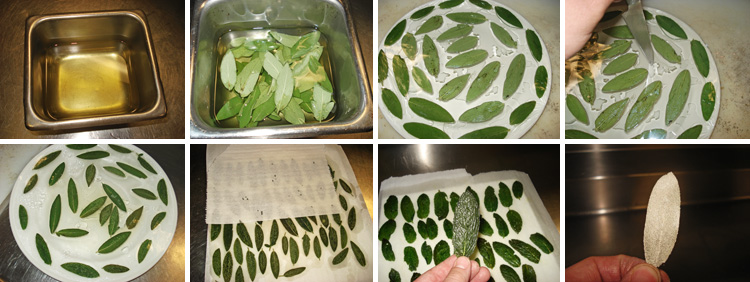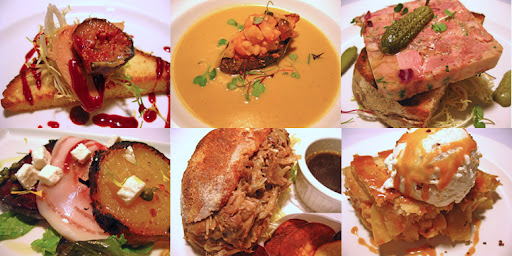10 Tips For Surviving A Professional Kitchen
Walking into a new kitchen for the first time can be an extremely scary thing. Each professional kitchen has its own culture and way of doing things. If you take one misguided step, you risk embarrassing yourself - not to mention possibly ending up in the ER with a chef-inflicted knife wound. To help you make a good first, and lasting impression, and to avoid costly doctor bills, here are my top ten tips for surviving a professional kitchen.
1) Always Stay Calm.
This is much easier said then done. Professional kitchens are extremely high stress environments and it takes discipline and nerves of steel not to freak out. When someone in my kitchen is nervous, it makes me nervous and it makes the chef really nervous. We can smell your fear like a pack of wild dogs tracking an injured animal. Even if you're freaking out on the inside, you need to project a calm exterior; this will show that you have confidence in yourself and your abilities. Also, it's not your job to start screaming at one of your fellow cooks or the wait staff. (Let the Sous Chef or Chef handle that one.) I know Mr. Wanna-Be-Tom-Cruise-Waiting-Tables-Until-He-Gets-His-Big-Break is a smug, arrogant prick. He wouldn't know good food if you force fed him a French Laundry tasting menu. Guess what, he's not your problem! So calm down and focus on the food before the chef kills you.
2) Move Deliberately And With Efficiency.
This point can not be over stressed. In a professional kitchen efficiency of movement is key. A dead giveaway that you're a "shoemaker" is when you start running around the kitchen like a damned chicken with its head cut off. Take a moment to collect your thoughts, gather your product for prep, and cut out any unnecessary movements. Here's a tip: anytime you have to pick something up or put it down, that's considered a step. Break your production into small steps to minimize movement and maximize speed and efficiency. I once had a sous chef that anytime he saw me working inefficiently, he would come up, put his arm around me and say, "Let me tell you the story of this guy named Henry Ford..."
3) Always Ask For Clarification.
If you're not clear on a task that has been assigned to you, ASK! Sure, if you make a habit of this, it will probably piss the chef off because it shows that you're not paying attention. However, the worst thing you can do is to be unsure about a task or technique and end up preparing the food wrong. Great kitchens are all about consistency. Trust me, you're much less likely to get smacked upside the head with a hot saute pan when asking for clarification than for screwing up the chef's food.
4) Don't Pretend You Know More Than You Do.
Don't BS people about your knowledge or experience. If anything, you need to under promise and over deliver. Professional cooks and chefs are an extremely egotistical bunch; there's a lot of pompous talk about talent and knowledge. Learn to walk-the-walk before you talk-the-talk. Also, stop trying to impress people with French culinary terms. If they're applicable in the conversation, then use them. However, don't start throwing out some terminology to try and impress the chef. He'll be plenty impressed if you can learn the food and produce a consistent product.
5) Be Aware of Your Surroundings.
A kitchen is a crowded, hectic place. Let people know where you are at all times. Yell "corner" when walking around a corner. Say "Behind You" when walking behind someone. Say "Sharp" if you're walking by someone with a sharp knife and say "Hot" if you're walking around the kitchen with a hot pot. Not adhering to these rules is considered rude and dangerous, not to mention that it's a dead giveaway that you haven't spent much time in a professional kitchen. For a seasoned pro, these “call outs” are second nature. Chefs have been known to body check cooks into stoves when they try and walk behind them on the hotline without saying "Behind."
6) Do Your Homework.
Most restaurants have web pages complete with their menus. Read the menu and do research on any terms or dishes that you're not familiar with. Also, Google the restaurant name and the Executive Chef's name and read any article or web page to better understand what you're getting yourself into. This should be done before you even apply for the job. Make sure you're familiar with the restaurant, their food, and the chef's reputation before stepping foot into a new kitchen.
7) Shut Up And Stop Brown-Nosing!
When you first start in a new kitchen, try not to talk unless spoken to, or ask a direct question about the food or the current task at hand. Learn the cultural dynamics of the kitchen before you open your mouth and make a fool of yourself. The easiest way to alienate yourself on the first day of your new job is by being a “Chatty Cathy”. And for God's sake, DON'T BROWN-NOSE! If you want to gain the chef's favor, keep your mouth shut, work hard, and follow the tips in this article. Trust me, the chef already knows how awesome he is, even if he really isn't.
8) Be Clean And Organized.
Always keep your station clean and organized, and be sure to put everything in its proper place before moving onto another task. Keep all your product organized around your work station, and try to keep your jacket and apron as clean as possible. You can usually identify the pecking order of any kitchen by how dirty the aprons and jackets are. The dirtier the jacket, the lower down the totem pole they usually are.
9) Limit Your Vices.
This may seem like a strange tip if you've never worked in a professional kitchen. The fact of the matter is, people who work in restaurants tend to be a hard- partying bunch. If you've spent anytime in the industry, chances are you've seen your fair share of extremely talented individuals self-destruct because of problems with alcohol and drug abuse. You'd be surprised how much of an advantage you'd have over other people in the industry if you're not constantly showing up to work hung over or drained from other forms of degenerate partying.
10) Have A Purpose.
Working in a professional kitchen requires so much time, effort, and energy that you will not last if you don't have a purpose for being there. Maybe it's to study under a great chef, or to see how the restaurant is managed. Whatever it is, make sure the restaurant you work at is moving you towards your culinary goals. You do have a goal, don't you? You better, because if you don't, you're doomed to be a miserable failure.
What Is Your Tip? Do you work in a professional kitchen. What tips do you have for surviving this crazy line of work? Click on the comment button below to let me know.


